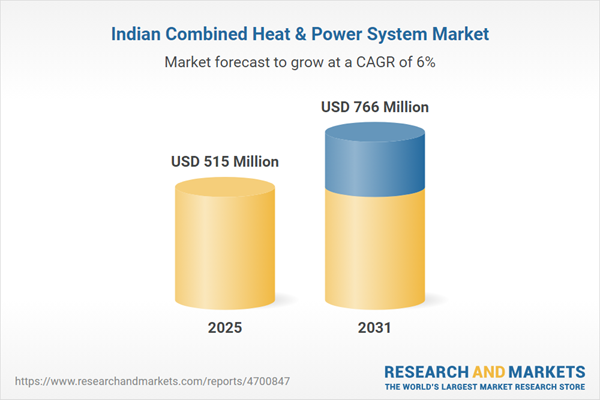Speak directly to the analyst to clarify any post sales queries you may have.
10% Free customizationThis report comes with 10% free customization, enabling you to add data that meets your specific business needs.
It offers improved energy security, reduced transmission losses, and cost savings through on-site generation. The market is benefiting from rising industrial energy needs, unreliable grid infrastructure in some areas, and the government’s push for energy efficiency. CHP systems are also increasingly integrated with renewable energy sources, making them a sustainable and flexible solution for decentralized power generation. As India continues to prioritize energy resilience and environmental responsibility, CHP systems are emerging as a viable and cost-effective technology for industrial and commercial users alike.
Key Market Drivers
Growing Industrial Energy Demand and Efficiency Needs
India’s expanding industrial base is driving a sharp increase in energy requirements, particularly in sectors like chemicals, textiles, cement, and food processing that need both electricity and thermal energy. Combined Heat and Power (CHP) systems are well-suited for these industries, as they generate both energy forms from a single fuel source, significantly improving energy efficiency.By reducing dependency on grid electricity and utilizing fuel more effectively, CHP helps lower energy costs and operational expenses. On-site generation also addresses reliability concerns in industrial zones with frequent grid disruptions. Additionally, government initiatives such as the Perform, Achieve, and Trade (PAT) scheme encourage industries to adopt energy-efficient technologies like CHP, offering incentives in the form of energy-saving certificates. These factors collectively position CHP as a strategic solution for energy-intensive sectors seeking operational cost savings, energy reliability, and compliance with regulatory mandates.
Key Market Challenges
High Capital Costs and Long Payback Periods
The deployment of CHP systems in India is often hindered by their high upfront capital requirements. These systems involve complex integration of multiple components - including turbines or engines, heat recovery units, and control systems - which significantly increase installation costs compared to conventional boilers or standalone power generators.Small and medium-sized enterprises, which dominate India’s industrial landscape, frequently lack the capital or financing options to invest in such long-gestation projects. With payback periods ranging from 4 to 10 years depending on system size and fuel costs, many companies are deterred from adopting CHP without government subsidies or concessional financing. Although support programs exist, they are often sector-specific and difficult to access due to bureaucratic procedures. The lack of technical know-how and financial advisory services further compounds the problem, especially for smaller enterprises, making capital expenditure one of the most persistent roadblocks in scaling up CHP adoption across diverse industrial segments.
Key Market Trends
Integration of Renewable Fuels in CHP Systems
A major trend gaining momentum in the Indian CHP market is the integration of renewable and alternative fuels such as biomass, biogas, and municipal solid waste into cogeneration systems. With growing regulatory pressure to reduce carbon emissions and promote sustainability, industries are shifting from fossil fuel-based CHP units to those powered by agricultural residues, organic waste, and biogas. Sugar mills and agro-processing facilities are leading adopters, utilizing waste biomass for efficient energy generation.Likewise, food processing units and distilleries are increasingly turning to biogas-based CHP to meet sustainability goals and reduce fuel costs. These systems are particularly suited for decentralized applications in rural or semi-urban areas with limited grid access. The growing use of hybrid CHP systems that co-fire renewable fuels with conventional ones ensures fuel flexibility while meeting performance benchmarks. As advancements in technology make these systems more reliable and cost-effective, the adoption of renewable-fueled CHP is set to rise, aligning with India’s broader goals of energy self-sufficiency and environmental stewardship.
Key Market Players
- Caterpillar Inc.
- General Electric Company
- Siemens AG
- Cummins Inc.
- Mitsubishi Heavy Industries, Ltd.
- ABB Ltd.
- MAN Energy Solutions SE
- Wartsila Corporation
Report Scope:
In this report, the India Combined Heat & Power System Market has been segmented into the following categories, in addition to the industry trends which have also been detailed below:India Combined Heat & Power System Market, By Prime Mover:
- Gas & Steam Turbine
- Reciprocating Engine
- Fuel Cell
- Microturbine
India Combined Heat & Power System Market, By Capacity:
- 30 kW to 1 MW
- 1.1 MW to 5 MW
- 5.1 MW to 10 MW
- Above 10 MW
India Combined Heat & Power System Market, By End User:
- Industrial
- Utilities
- Commercial
- Others
India Combined Heat & Power System Market, By Region:
- South India
- North India
- West India
- East India
Competitive Landscape
Company Profiles: Detailed analysis of the major companies present in the India Combined Heat & Power System Market.Available Customizations:
With the given market data, the publisher offers customizations according to a company's specific needs. The following customization options are available for the report.Company Information
- Detailed analysis and profiling of additional market players (up to five).
This product will be delivered within 1-3 business days.
Table of Contents
Companies Mentioned
- Caterpillar Inc.
- General Electric Company
- Siemens AG
- Cummins Inc.
- Mitsubishi Heavy Industries, Ltd.
- ABB Ltd.
- MAN Energy Solutions SE
- Wartsila Corporation
Table Information
| Report Attribute | Details |
|---|---|
| No. of Pages | 70 |
| Published | May 2025 |
| Forecast Period | 2025 - 2031 |
| Estimated Market Value ( USD | $ 515 Million |
| Forecasted Market Value ( USD | $ 766 Million |
| Compound Annual Growth Rate | 6.0% |
| Regions Covered | India |
| No. of Companies Mentioned | 8 |









